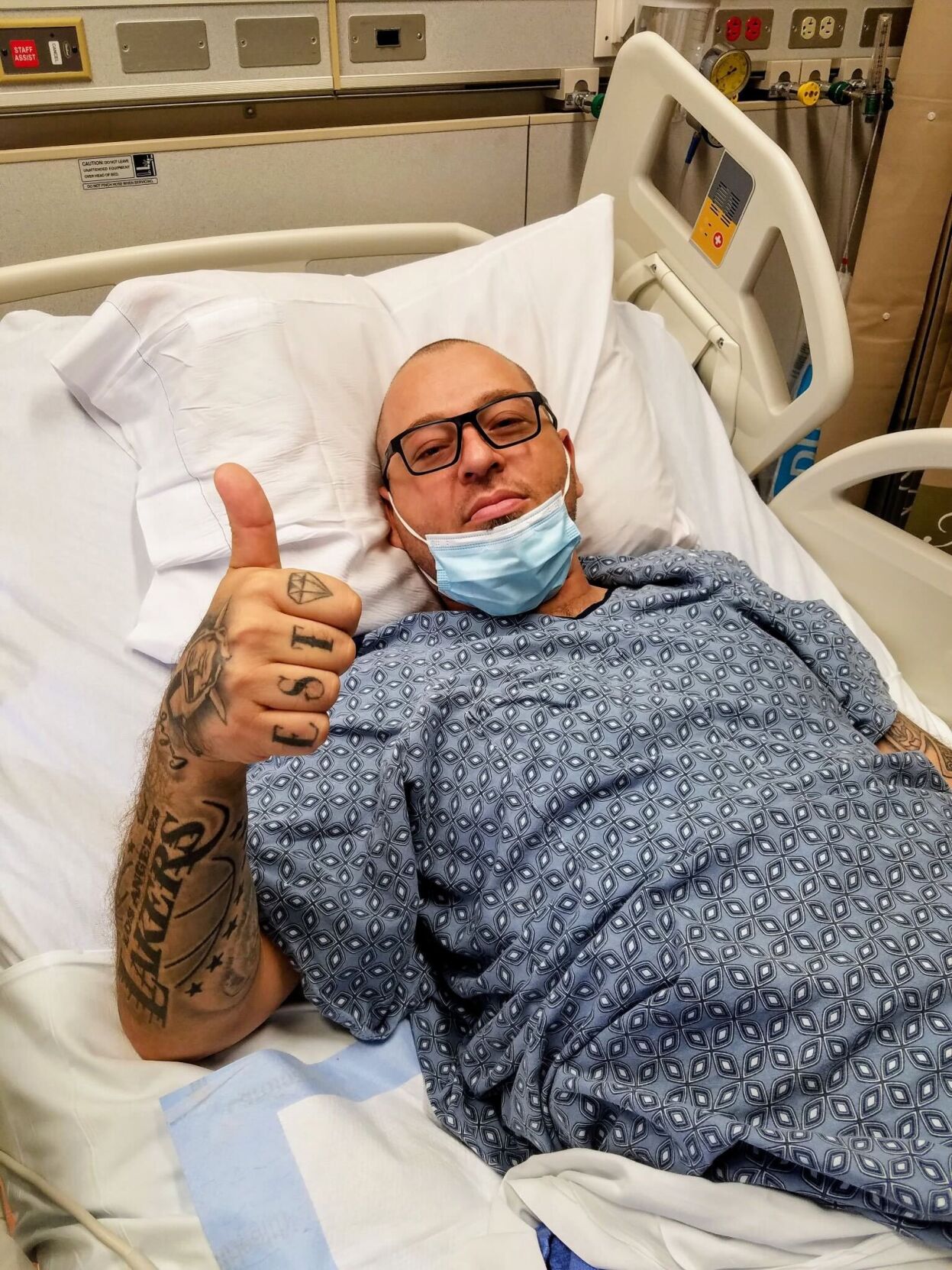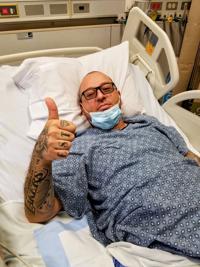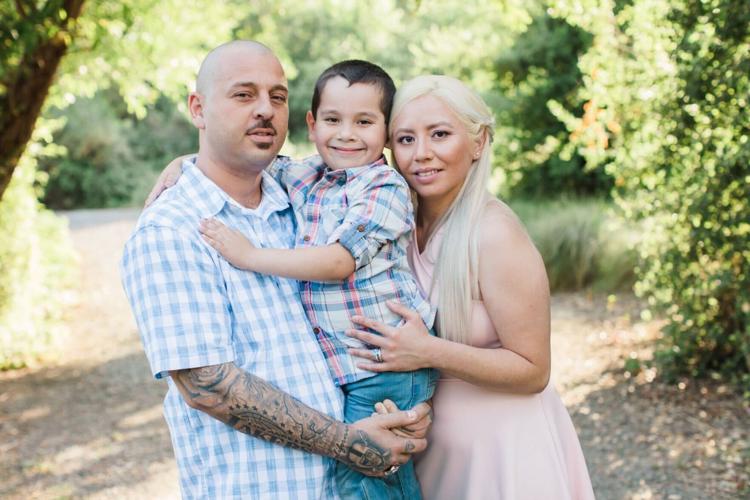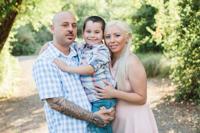
Before receiving a kidney transplant, Christian Aceves spent a little over six years on dialysis. (Photo courtesy of Christian Aceves.)
In honor of National Hispanic Heritage Month, DaVita is raising awareness about the need for registered organ donors in the Latino community. Similar to the under-representation of Latinos in medical and clinical trials, they are underrepresented in organ donations as well.
Within the Latino community specifically, there is a significant gap between the number of Latino organ donors and the number of Latinos in need of lifesaving organ transplants. Health experts say the need for organ donors in the Latino community is crucial.
In 2024, the number of organ transplants performed on Latinos was about 18.9%, compared to the 22.6% of Latinos currently waiting for a transplant, according to the U.S. Department of Health and Human Services Office of Minority Health.
CALÓ News spoke with 40-year-old Christian Aceves about the importance of raising awareness, especially for individuals like him, who were on dialysis before receiving a kidney transplant. “I think spreading awareness on this important matter sheds a light on how many people truly need transplants and are in need of help, and it does dispel the myths about organ donation that people might think,” he said.
Before receiving a kidney transplant, Aceves spent a little over six years on dialysis. He initially went to a clinic three times a week for treatment, but after two and a half years, he switched to peritoneal dialysis, a daily process that he was able to do at home. Just like a kidney works every day, home dialysis was a much better option for him. Even though he had to do it every day, it was making him feel a lot better as well.
While being on dialysis, some of the challenges that Aceves had to face were quitting smoking cigarettes. “Up until that point, I smoked cigarettes for almost a decade, almost 10 years. And so that changed real quick. I haven't smoked cigarettes since 2015,” he said. Not only did he quit bad habits, but he also changed his eating habits as soon as he started treatment.
About six years ago, Aceves received a phone call that would change his life around. He recalls getting a call that morning and not answering the first time around. “Loma Linda was calling me.
They had to send out the sheriffs at 5:00 a.m. in the morning to knock on my door. And I was connected to the dialysis machine, and my wife answered the door, and they asked for me,” he said.
The sheriffs delivered an urgent message to his wife, which was that Loma Linda University Medical Center was attempting to contact him regarding a possible kidney transplant, and he needed to arrive at the hospital immediately. “I arrived around 7 o’clock and felt a sense of happiness. I wasn’t nervous,” Aceves recalled. However, the medical staff is careful to manage expectations, as everything ultimately depends on whether the kidney is a suitable match and compatible.
Following the successful kidney transplant, Aceves faced a new set of challenges. He shared that during the first six months post-surgery, he was required to visit the clinic three times a week for blood work and routine checkups. His wife, who served as his primary caregiver, accompanied him to each appointment. These visits began early in the morning and often lasted up to seven hours per day.
Even though his wife had a full-time job, after Aceves received the kidney transplant, she had to apply for Family Medical Leave Act. As Aceves couldn’t drive for the first months after his surgery. “It was very challenging right after surgery, having to have those long days, blood work, getting poked with needles and having to see the doctor; that was very challenging at first,” he said.

Christian and his family. (Photo courtesy of Christian Aceves.)
Since receiving the transplant, Aceves says he feels much happier than he did during his time on dialysis. Still, he admits that the recovery after surgery was tough and took a real physical toll on his body. “I’m happy and I feel my energy levels rising again. That feeling made me more ecstatic, and I've been great ever since,” he shared.
He also told CALÓ News that his wife has been his greatest support system during this journey. “My wife has been a huge help. She's always been positive and kept me positive and kept me away from having negative thoughts even though I was down a lot when I was on dialysis,” Aceves said. “After the transplant she was very encouraging and always by my side. Since I was first diagnosed, she has never left my side. She's the one that helped me stay positive and on track.”
Now that Aceves has fully recovered, he is officially part of the DaVita team, where he supports others on their kidney journey while also educating and raising awareness among Latino patients. “I'm grateful to be part of the team after my transplant. I was excited to start work again because I worked before,” he said.
Before joining the DaVita team, he worked for a company called Sierra Aluminum, and Aceves was a quality control inspector. He was in charge of inspecting the painted aluminum coming out and making sure it was up to par for the customers. He worked there for about six years prior to getting sick. After finding out about his diagnosis, he had to completely stop working.
“When I got my transplant, I was excited to return to work, but I never thought I would end up working for DaVita,” he said. “Now at the DaVita center I’m helping other patients get their treatment, like how I used to do my treatment, so I could totally relate to what they're going through, and I'm happy, you know, that I'm able to help them in their process and their journey because I know what they're going through. I've been in their shoes.”
Anyone in need of dialysis treatment, regardless of where they normally get treated, can receive care at any of the DaVita centers. Kidney failure affects almost 750,000 people per year in the United States. The disease disproportionately affects the nation’s minority and low-income patients.
While kidney disease is preventable with proper awareness and education, DaVita and the YMCA have also recently joined forces to promote kidney health initiatives through the Collaborative Community Kidney Health Program (CCKHP) in order to support Latino communities across Los Angeles.
The health program has been implemented in six other YMCA locations nationwide with the goal of raising awareness about chronic kidney disease risk factors, offering chronic disease screenings and connecting at-risk individuals with vital kidney health education and resources that they may need.
As Aceves is getting another opportunity in life, he's excited to pursue new goals. Although he just got hired at DaVita, his ultimate goal is to become a patient educator so that he is able to help patients find better treatment options. “When I became a DaVita patient, I really didn't know about dialysis or kidney failure, and I want to let them know, educate them about their choices that they do have and that they don't have to be in a clinic and that they can do their dialysis at home.
According to the Donate Life California Donor Registry, “Knowing that you have the power to give someone else a chance to live a healthy, productive life is the greatest gift of all.”
To register as an organ donor, click here.












(0) comments
Welcome to the discussion.
Log In
Keep it Clean. Please avoid obscene, vulgar, lewd, racist or sexually-oriented language.
PLEASE TURN OFF YOUR CAPS LOCK.
Don't Threaten. Threats of harming another person will not be tolerated.
Be Truthful. Don't knowingly lie about anyone or anything.
Be Nice. No racism, sexism or any sort of -ism that is degrading to another person.
Be Proactive. Use the 'Report' link on each comment to let us know of abusive posts.
Share with Us. We'd love to hear eyewitness accounts, the history behind an article.